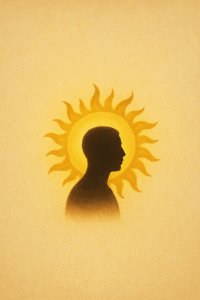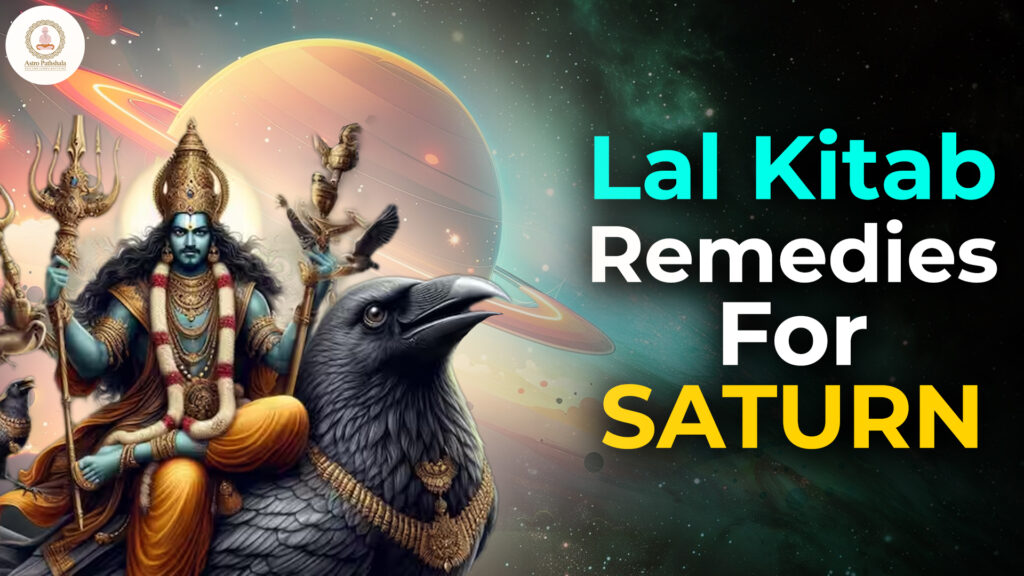
Introduction
In Lal Kitab’s philosophy, the horoscope is imagined as a house built with twelve walls. Each wall represents a bhav (house), and the strength or weakness of these walls decides how stable the entire life structure remains. The most significant of these is the first house, or Lagna, which represents the self, body, character, and the portal to one’s fate. Lal Kitab compares it to the eastern wall of a house, the first wall to embrace the rays of the rising Sun.
Now, imagine what happens when the Sun itself sits in this very house. It is like placing a blazing torch at the entrance. The whole house is bathed in light, and the world sees this person shining with confidence, dignity, and authority. However, just like fire, this light can be constructive or destructive. A steady flame warms and guides, but an uncontrolled blaze can burn and blind.
Surya – The King Among Planets
Mekha Rashi and its Rashipati, Mars, are friends of the Sun. Here, the Sun gains strength and Saturn, its enemy, is weakened. If Mars is well placed and stable in the horoscope while the Sun occupies the first house, the person enjoys prosperity and property, gaining advantages from all directions. However, when enmity with Saturn is active, physical challenges may persist for 15 years. In Aries (Mekha Rashi), Mars, as the ruling planet, reinforces the Sun’s positive influences, favouring health and royal matters. A favourable Mars promises good outcomes for wealth and children, though Saturn’s enmity still brings years of physical difficulty.
The Fruits of the Sun in the 1st House
Benefic Sun
If the Sun is strong and benefic in the Lagna, the person is born with natural leadership qualities. They carry themselves with confidence, often commanding respect without even needing to ask for it. Their aura feels warm and magnetic, making them noticeable in any crowd.
Such natives often hold positions of authority, whether big or small. They may become leaders, administrators, or simply the head of their family. The respect they earn comes not only from their power but also from their inner dignity and fairness.
Physically, they are blessed with good health, strong bones, and vitality. Their face often shines with a glow, their eyes are sharp, and their walk reflects self-assurance. Even if they are not wealthy, their personality itself makes them appear rich.
Family life, especially the relationship with the father, is essential here. A benefic Sun blesses the person with the support and blessings of their father. The father may be a respected individual in society, and his influence shapes the child’s destiny in positive ways.
Lal Kitab compares this placement to placing the Sun at the door of the house itself. The entire house glows with sunlight. Guests feel welcome, neighbours look up to the family, and the household is never lacking recognition in society.
Malefic Sun
However, when the Sun is afflicted in the first house, the same brilliance may overwhelm rather than illuminate. One may become arrogant, domineering, or overly proud. Desiring respect but lacking humility, such individuals may frequently encounter conflicts with others.
The father-child relationship may become strained. Instead of blessings, the father may become a source of conflict or separation. Sometimes the father’s health may suffer, or the person may feel deprived of his support.
On the physical side, excessive inner heat may bring fevers, eye troubles, headaches, or high blood pressure. Their presence may feel intense or intimidating, casting a sharpness rather than warmth.
Socially, they may earn enemies due to their bluntness. Even if they mean well, their words may cut like swords. Instead of admiration, people may secretly resent their arrogance.
Lal Kitab’s metaphor is like having a blazing fire at the doorway. Instead of warming the house, it scorches the walls and scares away visitors. The same Sun that could give prestige now brings isolation.
Lal Kitab’s Symbolism
- The Lal Kitab interpretation beautifully simplifies the Sun’s placement in Lagna. The 1st house is the eastern wall, and the Sun here is like the real Sun rising at the very gate of life. If its rays are balanced, the entire house flourishes. If too harsh, they blind and burn.
- Thus, the Sun in the 1st house becomes a symbol of self-responsibility. The native must decide whether to use this fire as light or as destruction.
Remedies for Sun in the 1st House
Lal Kitab does not recommend complicated or ritualistic remedies. Instead, it offers symbolic and practical actions that balance planetary energies in daily life.
For Sun in the Lagna, especially if afflicted, the following remedies are suggested:
Respect Your Father and Elders: The Sun represents the father. Never insult or disrespect him. Even if relations are strained, maintain humility. Serving father-like figures brings Surya’s blessings.
Offer Water to the Sun: Every morning at sunrise, offer water in a copper vessel, facing east. This simple act aligns one’s energy with the cosmic Surya.
Avoid Ego and Harsh Speech: Control arrogance. Speak with warmth instead of harshness. Words should reflect the light of the Sun, not its scorching heat.
Donate Wheat, Jaggery, or Copper Items: On Sundays, consider donating these items to those in need. This pleases the Sun and reduces its malefic effects. Keep the East Side Clean and Bright: The east side of the home should always be clutter-free and well-lit. Allow sunlight to enter freely. Avoid Alcohol and Dishonesty: Both weaken the Sun’s energy, turning confidence into arrogance and vitality into sickness.
Conclusion
The Sun in the 1st house is both a blessing and a challenge. It grants charisma, confidence, and natural leadership. It makes the person stand out in society, carrying an aura of authority and respect. Yet, it demands humility, respect for fatherly figures, and disciplined self-control.
Lal Kitab describes it in its poetic style, as though the Sun has been placed at the very doorway of life. If this Sun is honoured, nurtured, and respected, it blesses the entire household with prestige, vitality, and respect. If neglected, it burns with arrogance, leaving cracks in the very foundation of destiny.
Thus, the proper remedy lies not only in rituals but in living a life of humility, service, and balance. The Sun in the first house invites us to become a steady flame – not a destructive fire, but a guiding light for ourselves and for the world.


